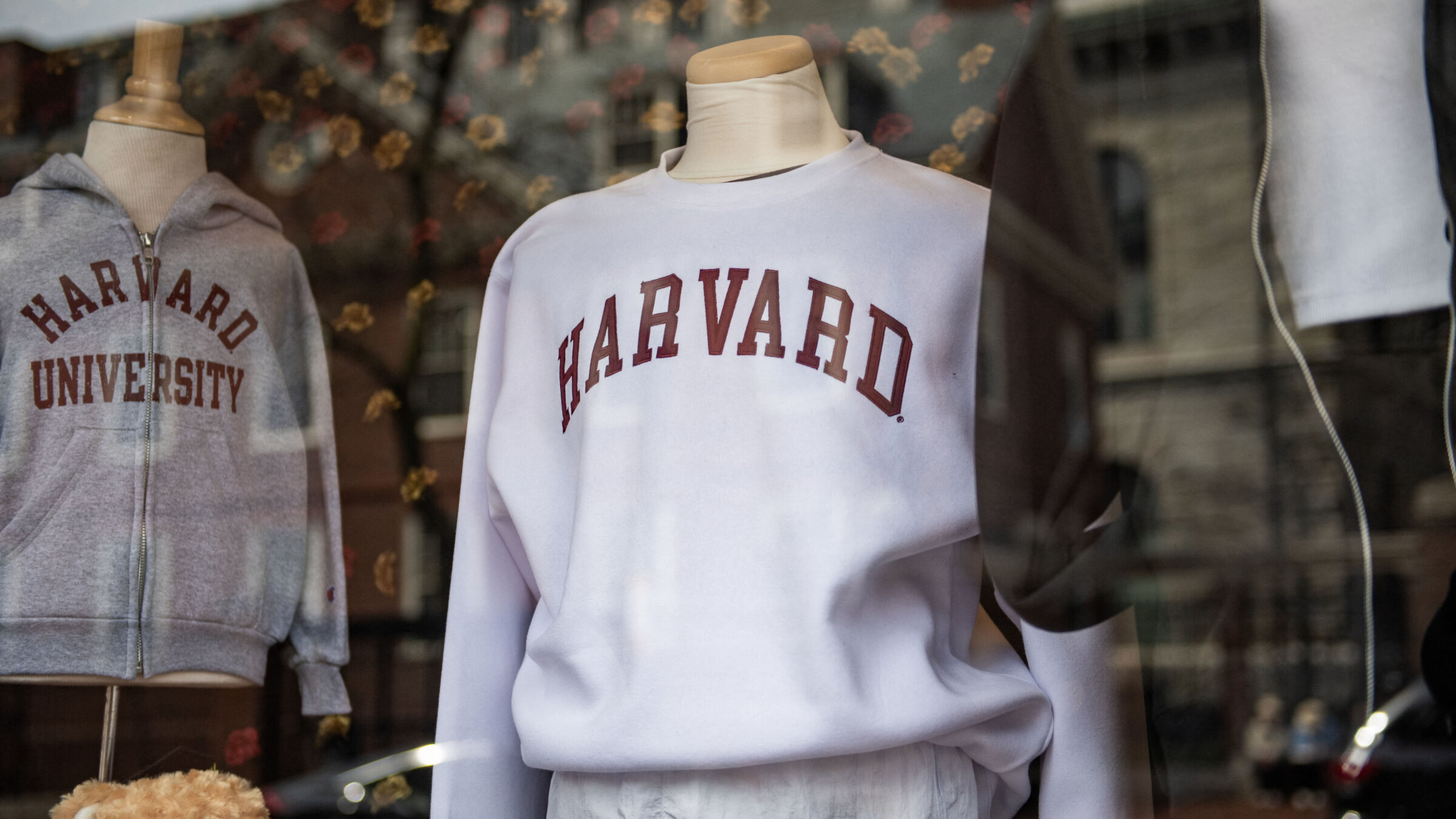What Jewish university presidents say: Trump is exploiting campus antisemitism, not fighting it
Jewish university presidents are demonstrating more chutzpah than some of their counterparts

Harvard sweatshirts are displayed for sale in a school store on campus in Cambridge, Massachussetts. The elite U.S. university Harvard rejected sweeping demands from the federal government that the White House ordered to crack down on antisemitism. Photo by Joseph Prezioso/AFP via Getty Images
There’s one thing that unites the university presidents that have so far prominently stood up against President Donald Trump’s ongoing assault on higher education: They’re Jewish. Clearly, some people are feeling the “hell no, Pharaoh” energy more than others this Passover.
Start with Harvard University’s president, Alan Garber, who on Monday issued the most forceful rebuke yet to Trump’s efforts to establish federal control over campuses. In a letter to students, faculty and staff, Garber wrote that Harvard would reject the “unprecedented demands” that the federal government had made, under the guise of combating antisemitism on Harvard’s campus, for the university to avoid the freezing of up to $9 billion in federal grants and loans. “The University,” Garber wrote, “will not surrender its independence or relinquish its constitutional rights.”
In addition to Garber, Christopher Eisgruber, president of Princeton University; Jonathan Levin, president of Stanford University; Michael S. Roth, president of Wesleyan University; and Sally Kornbluth, president of MIT, have all publicly voiced their resistance or signed onto lawsuits fighting the administration’s cuts. These Jewish presidents are actively defining what antisemitism actually is in the face of the Trump administration’s weaponization of the term, and organizing their fellow college presidents in response to the federal government’s assault.
Since campus protests first broke out over the war in Gaza, Trump has been adamant that antisemitism must be rooted out from American universities by deporting pro-Palestinian student protesters. Last May, he told a room of donors that “any student that protests, I throw them out of the country.” And Trump’s secretary of education, Linda McMahon, has repeatedly accused universities like Harvard of failing to protect their students from antisemitism, warning 60 universities in March that they would face “enforcement actions” if they did not remedy “the relentless antisemitic disruptions” on campus.
The government has followed through on Trump’s threat, reportedly revoking more than 1,000 student visas since Trump’s second term began in January; many of the most high-profile students and recent graduates to be arrested and detained, like Mahmoud Khalil and Rümeysa Öztürk, were targeted because of their pro-Palestinian advocacy.
It’s poignant, and illuminating, that Jewish university presidents are demonstrating more chutzpah in the face of this government onslaught than some of their counterparts. Many of them were aghast after Columbia University capitulated to the Trump administration’s demands, including making significant changes to their admissions policies.
“I can’t draw a connection between the stated concern of remedying antisemitism and a suggestion that Columbia should do comprehensive admission reform,” Eisgruber, the Princeton president, told The Daily in the wake of Columbia’s decision. (Columbia’s new interim president, Claire Shipman, has since suggested that Columbia might not be quite as flexible as previously indicated.) And he expressed disappointment that Columbia had not expressed regret or acknowledgment of the principles at stake in their decision to capitulate.
“You may say ‘Look, I wish I could take a stand on principle, but given what’s at stake, I can’t,’” he said. “But then you need to say that.”
And they were quick to identify that Trump’s campaign didn’t really seem to be about fighting antisemitism at all, but rather about using that fight as a justification for government overreach. Roth, a historian as well as the president of Wesleyan, told The New Yorker that “Anti-antisemitism can be appropriated by any political movement. They can use that as a vehicle for persecuting researchers and institutions that are not aligned with the ideology of the person in charge.”
Other Jewish university presidents have taken a quieter, but no less meaningful, stance. Sally Kornbluth of MIT was one of the few university presidents to keep their jobs after a scathing Senate hearing on campus antisemitism last spring. This February, she announced that MIT had signed on to a lawsuit against the federal government to attempt to block “indiscriminate” cuts to research funding.
In the same statement, Kornbluth also spoke out against the visa revocations of international students at MIT, arguing that such actions “damage American competitiveness and scientific leadership for decades to come.”
American Jews are currently in a deeply painful bind. Yes, there is real antisemitism in this country, including, but not limited to, on college campuses.
But now, in the name of keeping Jews safe, we are watching the government send students guilty only of exercising their right to free speech to ICE detention centers. And that, even aside from its alarming implications for our democracy, very clearly risks making people think that Jews control the universities — if not the government — and want to imprison people for pro-Palestinian beliefs.
The truth is that it is a minority of extremist Jews who want to do that. And government interference in matters of speech has, historically, never been for Jews’ benefit — just check out the vast numbers of Jews affected by the terrors of the McCarthy era.
The exhaustion all these contesting forces create is part of the point of Trump’s efforts. His administration aims to create a reality that is so complicated that it requires an almost-superhuman amount of effort and investigation to fully comprehend it.
The significance of Jewish university presidents standing up to Trump is a meaningful way to push back on this confusion. They know their universities, and they are refusing to let Trump use antisemitism as a cudgel to unmake them.
















